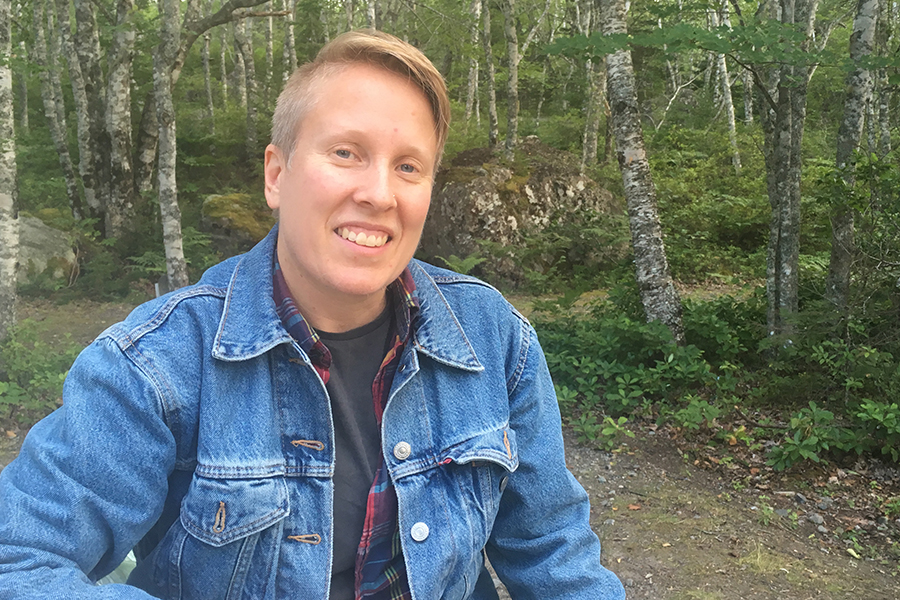
Fenton Litwiller / Supplied photo
Fenton Litwiller’s research program builds recreation curriculum for queer youth
Gender expression, exploration and play is vital for 2SLGBTQ+ youth recreation programming
Fenton Litwiller’s is presently developing a youth recreation curriculum that explores gender through drag and everyday makeup, revealing the importance of gender affirming youth programming in the field of community development and recreation.
The genesis of Litwiller’s project came about while they were a postdoctoral fellow at Dalhousie University in Halifax, working at the Youth Project, an organization that serves queer youth in Nova Scotia. Litwiller began by asking the youth themselves what kind of programming they were interested in that wasn’t currently happening, and many expressed interest in learning about drag performance. From there, Litwiller applied for a small grant and hired local drag mentors to teach the youth about makeup and movement.
“In working with the mentors and in working with the youth we realized we should make this a longer project,” Litwiller explains, “and that the research context actually could become a kind of curriculum.”
Now, working as a professor at the University of Manitoba, Litwiller has been developing that curriculum and bringing it to different communities in Winnipeg and rural Manitoba.
Litwiller says they are interested in coming to any community that would like to support the project, and that they usually partner with local organizations to connect with youth and promote the workshops.
“As a researcher I’m looking for the ways in which drag is helpful as well as not helpful to explore gender, youth experiences of drag and gender in everyday life and at the workshop” Litwiller explains.
Gender identity and gender play
Something they have noticed throughout the workshops so far is the variety of ways that youth may use drag and makeup to explore their gender, and also the way gender play can be both related and unrelated to personal gender identity.
Put simply, gender identity refers to someone’s personal identity, unrelated to biological characteristics. Gender is a highly personal experience but is also something that is constructed by norms and expectations, and that everyone, including cis-gender people (meaning those whose biological sex aligns with their gender identity), performs in one way or another.
For transgender and non-binary folks, learning everyday makeup practices and skills can be an identity-affirming tool that allows them to present in a way that aligns with their gender.
However, makeup can also be a way to exaggerate and play with genders that aren’t necessarily related to one’s personal identity, which is also an important type of expression.
Drag is an exaggerated performance of gender that is fun, theatrical and a bit larger than life. Learning drag performance and how to do drag makeup can help youth learn about themselves, become more confident and try new things.
Litwiller explains that some youth are interested in learning makeup as a serious endeavour and others are more drawn to performative, theatrical drag makeup styles.
“For some youth it’s about being authentic and confident in a gender and for others it’s just play, so we access both aspects of play and seriousness and we have fun.”
Gender and sexuality research in the field of leisure studies
Litwiller’s project contributes to research in leisure studies and sexuality and gender studies that demonstrates the importance of gender exploration and expression in youth recreation contexts.
Discussions about 2SLGBTQ+ issues in the field of recreation often focus on sports programming, Litwiller says, but that this is far from the only type of recreation programming researchers should be examining to better the lives of queer youth.
Still, in terms of making the Faculty of Kinesiology and Recreation Management a more inclusive space for queer students, Litwiller agrees that it is vital that organizers of sports programming start to accommodate the needs of trans and non-binary students.
This can start at the level of ensuring that forms are gender-inclusive, and that washrooms and changerooms undergo structural changes that follow principles of universal design.
Overall, Litwiller says the purpose of their research, which will now be running out of a mobile lab that they’ve secured through Canadian Foundation for Innovation is to build community connections, meet youth where they are at and provide them with the tools to explore and express gender in a variety of ways.
“Youth don’t always have spaces to be serious about gender or to be frivolous with it and fun with it, so I think this provides a space for both.”
Litwiller hopes to expand their program throughout Winnipeg, rural Manitoba and Ontario over the next few years, and continue to build a community-oriented curriculum that serves the needs the queer youth in these communities.
If you have any questions about the project, or are a community organization that would like to get involved, please contact: Fenton.Litwiller@umanitoba.ca






